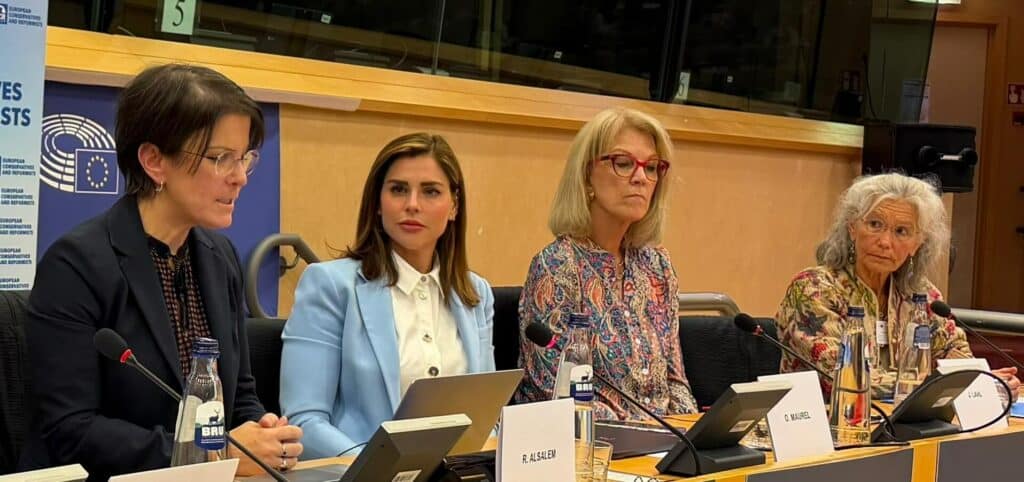Casablanca experts speak at the European Parliament during a major conference on surrogacy |
|
(French below) Brussels, 19 november 2025 A day before International Children’s Rights Day, a major conference entitled “Surrogacy: An Ethical and Political Challenge for Europe” was held today at the European Parliament, bringing together Members of the European Parliament, international experts, human rights organisations, and individuals directly affected by surrogacy. The purpose of the event was to examine the ethical, legal, and political implications of surrogacy in Europe and to assess how the European Union can protect the rights of women and children in the face of a rapidly expanding global industry. A European Event at the Heart of the Institutions The event was organised by Members of the European Parliament Paolo Inselvini, Bert-Jan Ruissen, and Stephen Nikola Bartulica. The opening session featured interventions from Laurence Trochu, Jadwiga Wiśniewska, Carlo Fidanza, and Nicola Procaccini, Co-Chair of the ECR Group. Italian Leadership One of the most notable remarks came from Eugenia Roccella, Italian Minister for Family, Equal Opportunities and Birth Rate, who emphasised the need for a human-rights-based approach rather than one guided by market dynamics or individual desire. Italy is today one of the leading nations in the global movement towards the universal abolition of surrogacy. The organisation of this conference at the European Parliament reflects this political and legal momentum. A Key Intervention from the United Nations The conference welcomed Reem Alsalem, United Nations Special Rapporteur on violence against women and girls. She reiterated the conclusions of her recent report to the United Nations General Assembly, in which surrogacy, in all forms, including so-called “altruistic” surrogacy, is recognised as a form of violence against women. She called on States to work toward its universal abolition through the creation of an international treaty. A Rapidly Expanding Global Market: A Critical Challenge for the EU Experts highlighted the exponential growth of the global surrogacy market, valued at 22.4 billion USD in 2024 and projected to reach 201.8 billion USD by 2034 (Global Market Insights). This expansion currently outpaces legal safeguards and risks creating a de facto transnational recognition of surrogacy contracts through practice rather than democratic decision-making. Civil Society Speaks with One Voice The panel brought together organisations from Italy, France, Belgium, Ireland, Croatia, the Netherlands, Spain, and the United States, united in the defence of the fundamental rights of women and children. Among them was the Casablanca Experts Group, represented by its spokesperson Olivia Maurel, herself born through surrogacy, and by its Executive Director, Dr Bernard Garcia, legal scholar. Speakers shared a principle unanimously affirmed throughout the event: “There is no such thing as a right to a child. But every child has fundamental rights, and these rights are neither negotiable, transferable, nor commercialisable.” A Clear Call to the European Union Participants urged the EU to: • Ensure that the European Certificate of Parenthood does not enable the de facto legalisation of surrogacy in Member States where it is prohibited; • Protect the child’s right to identity, origins, and true parentage; • Resist all forms of commodification of the human body and the child; • Support the development of a binding international treaty abolishing surrogacy, in line with the recommendations of the UN Special Rapporteur.
|

Reem Alsalem, Olivia Maurel, Jenifer Lahl, Anne Schaub at the European Parliament |
Les experts de Casablanca interviennent au Parlement Européen lors d’une conférence majeure sur la GPA |
|
Communiqué de presse, Bruxelles – 19 novembre 2025 A la veille de la journée internationale des droits de l’enfant, une conférence majeure intitulée « Surrogacy: An Ethical and Political Challenge for Europe » s’est tenue aujourd’hui au Parlement européen, réunissant des députés européens, des experts internationaux, des organisations de défense des droits humains, ainsi que des personnes directement concernées par la gestation pour autrui (GPA). L’objectif de cette rencontre était d’analyser les implications éthiques, juridiques et politiques de la GPA en Europe et d’examiner la manière dont l’Union européenne peut protéger les droits des femmes et des enfants face à une industrie mondiale en pleine expansion. Un événement organisé au cœur de l’Europe L’événement a été organisé par les députés européens Paolo Inselvini, Bert-Jan Ruissen et Stephen Nikola Bartulica. La session d’ouverture a réuni Laurence Trochu, Jadwiga Wiśniewska, Carlo Fidanza, ainsi que Nicola Procaccini, co-président du groupe ECR. Leadership italien Une intervention particulièrement remarquée a été celle deMadame Eugenia Roccella, Ministre italienne de la Famille, de l’Égalité des chances et de la Natalité, qui a rappelé l’importance d’adopter une approche fondée sur les droits humains et non sur des logiques de marché ou de satisfaction du désir individuel. L’Italie est aujourd’hui l’un des pays moteurs du processus visant à l’abolition universelle de la GPA. La tenue de cette conférence au Parlement européen s’inscrit dans cette dynamique politique et juridique. Une intervention majeure des Nations Unies La conférence a également accueilli Reem Alsalem, Rapporteuse spéciale des Nations Unies sur les violences faites aux femmes et aux filles. Elle a rappelé les conclusions de son rapport présenté lors de la dernière Assemblée générale des Nations Unies, dans lequel la GPA , dans toutes ses formes, y compris dites “altruistes”, est qualifiée de forme de violence contre les femmes. Elle appelle les États à travailler à son abolition universelle via l’élaboration d’un traité international. Un marché en expansion rapide : un défi urgent pour l’Union européenne Les experts ont alerté sur la croissance exponentielle de l’industrie mondiale de la GPA, estimée à 22,4 milliards USD en 2024 et projetée à 201,8 milliards USD en 2034 (Global Market Insights). Cette expansion précède aujourd’hui le cadre juridique et menace d’imposer, par le fait accompli, une reconnaissance transfrontalière des contrats de GPA. La voix de la société civile européenne : une unité dans la diversité Le panel a rassemblé des organisations provenant de plusieurs pays : Italie, France, Belgique, Irlande, Croatie, Pays-Bas, Espagne et États-Unis, toutes mobilisées pour la défense des droits fondamentaux des femmes et des enfants. Parmi elles figurait notamment le Groupe d’experts de Casablanca, représenté par sa porte-parole Olivia Maurel, elle-même née par GPA, ainsi que par son directeur exécutif, Bernard Garcia, docteur en droit. Les intervenants ont rappelé un principe essentiel partagé par l’ensemble de la conférence : « Il n’existe pas de droit à l’enfant. Mais chaque enfant possède des droits fondamentaux, et ces droits ne sont ni négociables, ni transférables, ni commercialisables. » Un appel clair adressé à l’Union européenne Les participants ont appelé l’Union européenne à : • Garantir que le Certificat européen de parentalité ne permette pas la légalisation de facto de la GPA dans les États qui l’interdisent ; • Protéger le droit fondamental de l’enfant à son identité, ses origines et sa filiation réelle ; • S’opposer à toute forme de marchandisation du corps humain et de l’enfant ; • Soutenir la création d’un traité international d’abolition de la GPA, conformément aux recommandations de la Rapporteuse spéciale des Nations Unies. |
